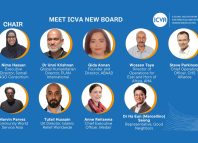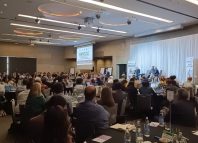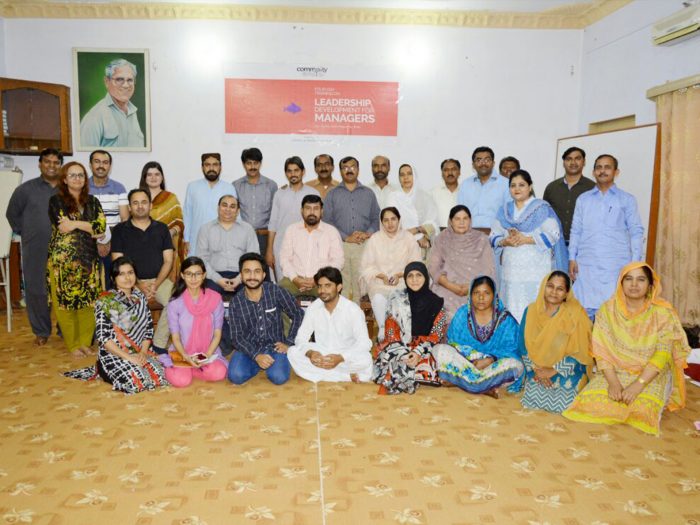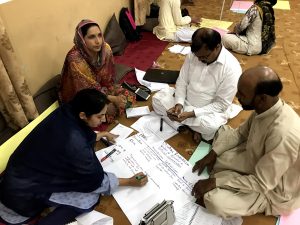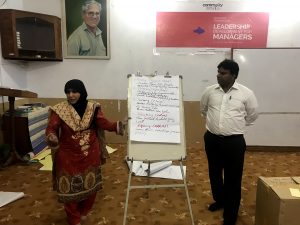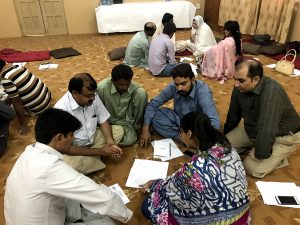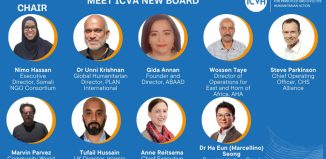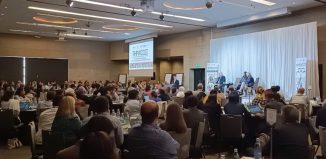Maximizing Local Organizations’ efficiency through Leadership Development
Most managers in local organizations are often not given many opportunities of professional training or grooming on enhancing leadership skills. These particular skills are crucial to achieving planned goals and to bring the best out of a team in any management role. To fill this gap and to further strengthen the role of managers, second-line leadership, and staff in supervisory roles in local NGOs or CSOs, Community World Service Asia organized a four-day workshop on Leadership Development, under its Capacity Enhancement Program in Mirpurkhas, Sindh, Pakistan. The training, organized in early May, was participated by twenty-seven professionals from eleven local level organizations in Sindh.
The training, which was in a “workshop” format, focused on introducing the various leadership styles recognized globally and strengthening management skills and professional competencies to lead and guide teams and individuals. Some of the key sessions of the training included “Difference between Leadership and Management Skills”, “Community types and style”, “Transactional Analysis and Coaching” and “Mentoring Skills”. Participants understood the difference between a good leader and a good manager and what characteristics stands them apart. An activity which aimed at identifying and mastering the five steps for team building helped the participants to reflect upon the critical stages of team building and how to facilitate the process. Referencing to real life challenges faced in work environments when attempting to conduct team building activities, this session was particularly relevant for most participants.
Transactional Analysis was a new approach introduced in the training. The session analyzed the social transformations of organizations. With the help of this session, the participants further built their knowledge on the various types of social transactions and how to avoid arguments or cross communication with colleagues in future.
Participants recognized the importance of mentoring and coaching towards developing second-line leadership and how vital it is for staff in managerial roles as it aids in limiting the risks of internal and external challenges faced by organizations.
Sohail Muhammad Ali, the lead trainer for the workshop applied interactive and participatory approaches throughout the training which allowed participants to be consistently engaged and active throughout the sessions. Participants voiced their concerns and opinions openly during the four-days workshop.
Participants’ Voices:
 “This was a unique training experience. To me the difference between western and eastern communications style was a new thing. We are always engaged in communication without knowing our style of communication, its pro and cons, strengths and weaknesses and limitations. The discussion on different communication models really helped me understand the different backstopping I personally face in my work. Now I can analyze my style of communication and work for further improvement.”
“This was a unique training experience. To me the difference between western and eastern communications style was a new thing. We are always engaged in communication without knowing our style of communication, its pro and cons, strengths and weaknesses and limitations. The discussion on different communication models really helped me understand the different backstopping I personally face in my work. Now I can analyze my style of communication and work for further improvement.”
Asad Chachar, Jagarta Social Welfare Organization (JSWO)
 “Training for Leadership Development for Managers was very informative. I learnt new approaches and tools including Transitional analysis, Emotional intelligence & trust building. These tools are indeed helpful in understanding the note of emotions, language style, communication type and understand what others want to communicate. Words alone do not give you the complete message. You have to understand the emotions and communication style of others to fully understand their message. Previously, we only focused on words which often created problems as there was no clarity or clear message. I am very hopeful this training will be helpful for me in my professional career and personal life”
“Training for Leadership Development for Managers was very informative. I learnt new approaches and tools including Transitional analysis, Emotional intelligence & trust building. These tools are indeed helpful in understanding the note of emotions, language style, communication type and understand what others want to communicate. Words alone do not give you the complete message. You have to understand the emotions and communication style of others to fully understand their message. Previously, we only focused on words which often created problems as there was no clarity or clear message. I am very hopeful this training will be helpful for me in my professional career and personal life”
Allah Dino Khoso, field office, Badin, Sindh, Community World Service Asia
 “I am relatively new to this sector and this training really helped me to understand the dynamics of management and leadership skills. The environment was very comfortable and it provided a culture of sharing and acquiring new skills together. The facilitator of the training was proactive in delivering the sessions. He possessed in-depth knowledge and shared good examples on the training subject. The workshop was very interactive and everyone was engaged throughout the training”
“I am relatively new to this sector and this training really helped me to understand the dynamics of management and leadership skills. The environment was very comfortable and it provided a culture of sharing and acquiring new skills together. The facilitator of the training was proactive in delivering the sessions. He possessed in-depth knowledge and shared good examples on the training subject. The workshop was very interactive and everyone was engaged throughout the training”
Beenish Mahak, Nishat Welfare Organization
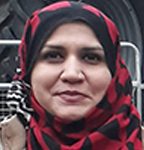 “We do say that leaders are born with leadership skills, however through capacity building programs, these skills can be developed among second line management as well. The culture of mentoring and coaching in the organizations builds a strong bond for staff within the organization. It increases their commitment and spirit to achieve higher targets and attain long term objectives of the organization. This is one of my key learnings from this training.”
“We do say that leaders are born with leadership skills, however through capacity building programs, these skills can be developed among second line management as well. The culture of mentoring and coaching in the organizations builds a strong bond for staff within the organization. It increases their commitment and spirit to achieve higher targets and attain long term objectives of the organization. This is one of my key learnings from this training.”
Fozia Kashif, Participatory Village Development Programme

